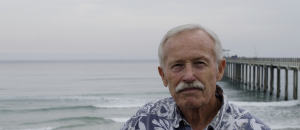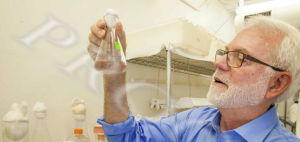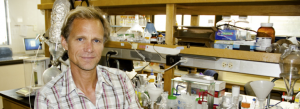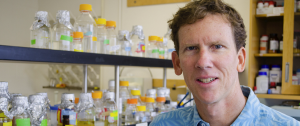Marine-Derived Medicines
Selection of Scripps Oceanography & UC San Diego research & resources
Natural product discovery
Natural products make up and inspire over half the FDA approved drugs over the past four decades1. The ocean represents a relatively unexplored habitat for natural product discovery, and marine organisms produce a wide variety of unique chemical scaffolds with biomedical potential. Research programs in the Center for Marine Biotechnology and Biomedicine (CMBB) at Scripps focus on marine biomedicine and marine drug discovery, with an emphasis on treating cancer, infectious disease and inflammation. CMBB scientists investigate a wide range of biotechnologies, from the special properties of deep-sea marine microbes to the algae of coral reef and the genetic engineering of commercially viable marine animals. With specialties in marine cyanobacteria, bacteria, and invertebrates, Scripps researchers have discovered hundreds of bioactive natural products. Salinosporamide, produced by a marine bacterium, is currently in phase II clinical trials as Marizomib for treatment of cancer. UCSD and Scripps labs have compiled a large compound library for high-thoughput assay testing, multiple collections of unique marine bacteria, and collections of marine invertebrates.
PIs: William Fenical, William Gerwick, Paul Jensen, Bradley Moore
Genome-driven discovery
Sequencing microbial genomes has revealed that their biosynthetic capacity for making natural products is far greater than what is observed in the lab. Moving these genes into genetically tractable and amenable strains allows researchers to interrogate these cryptic gene clusters. Researchers at Scripps have optimized a method called Transformation Associated Recombination (TAR) to capture biosynthetic gene clusters in a targeted, efficient way and express them in host bacteria. For the first time, researchers are able to access this hidden potential of bacteria. Scripps researchers work at the cutting edge of genome-driven discovery with specialties in genome mining, heterologous expression, genetic engineering, protein optimization, metagenomic sequencing, and bioinformatic tool development.
PIs: Andrew Allen, Eric Allen, William Gerwick, Paul Jensen, Bradley Moore
Molecular networking & metabolomics
Mass spectrometry has the ability to characterize minute amounts of molecules from large sample libraries. The UCSD made Global Natural Product Social Molecular Networking (GNPS) facilitates large scale networking and analysis of mass spectrometry data. GNPS also hosts multiple curated spectral libraries of known molecules for dereplication of large data sets. UCSD and Scripps labs have extensive expertise in multiple mass spectrometry, liquid chromatography, and NMR platforms and train their students in detailed data collection and analysis.
PIs: Pieter Dorrestein, William Fenical, William Gerwick, Paul Jensen, Bradley Moore
Access to extreme microbe communities
Microbial biodiversity remains one of the last great biotic frontiers, and developing effective strategies to discover and exploit new small molecules from this resource is integral to the success of future drug discovery efforts. Scripps hosts multiple unique collections of marine bacteria from extreme environments. Scripps labs have exclusive collections of marine microbes from the deep ocean to tropical sediments, and from filamentous cyanobacteria to the microbiomes of marine invertebrates. These underexplored sources of potential natural products provide a unique opportunity to access novel natural products.
PIs: Eric Allen, Farooq Azaam, Douglas Bartlett, William Fenical, William Gerwick, Paul Jensen
Chemical synthesis & biomimetic synthesis of marine natural products
Natural products from marine sources often have supply problems, making chemical synthesis the most viable option for interrogating natural products. Additionally, modification of natural product scaffolds using synthetic chemistry can increase efficacy and selectivity. Scripps researchers have extensive experience in synthesizing complex marine molecules using biomimetic and traditional synthetic chemistry. Scripps labs have created large libraries of modified natural products for testing in bioactive assays and have the capacity to synthesize a wide variety of chemical scaffolds. Recently, Scripps researchers developed a chemoenzymatic synthesis of acyl coenzyme A substrates to allow in situ labeling of small molecules and proteins2.
PIs: William Fenical, William Gerwick, Chambers Hughes, Bradley Moore
Marine protein expression & engineering
Marine bacteria produce numerous promising enzymes for biotechnological applications. Scripps researchers work to discover and engineer unique proteins from marine organisms. Marine enzymes often have unique properties, such as high salt and pressure tolerance, hyperthermostability, and cold temperature adaptability, making them attractive for biotechnological use. Additionally, marine bacteria often harbor unique biosynthetic enzymes for catalyzing rare chemical transformations in secondary metabolism pathways. Scripps researchers have unique access to and experience with such rare and novel enzymes, often discovering first in class enzymes participating in unprecedented chemical transformations.
PIs: William Gerwick, Bradley Moore
Noted references
1 Newman, D. J. & Cragg, G. M. Natural Products as Sources of New Drugs from 1981 to 2014. J Nat Prod 79, 629-661, doi:10.1021/acs.jnatprod.5b01055 (2016).
2 Agarwal, V. et al. Chemoenzymatic synthesis of acyl coenzyme A substrates enables in situ labeling of small molecules and proteins. Org Lett 17, 4452-4455, doi:10.1021/acs.orglett.5b02113 (2015).
Work with Scripps
- Access leading scientists in bio-inspired design, algae technologies, and biomimicry
- Design collaborative research
- Get a seat at the table for the latest scientific updates
- Learn how to implement newest expertise & methods
- Work with talented Scripps students and postdocs as potential hires

Skaggs School of Pharmacy and Pharmaceutical Sciences
Depts of Pharmacology and Pediatrics

Dr. William Fenical, Distinguished Professor of Oceanography
Scripps Institution of Oceanography
Skaggs School of Pharmacy & Pharmaceutical Sciences

Scripps Institution of Oceanography
Skaggs School of Pharmacy & Pharmaceutical Sciences

Scripps Institution of Oceanography

Scripps Institution of Oceanography
Skaggs School of Pharmacy & Pharmaceutical Sciences
